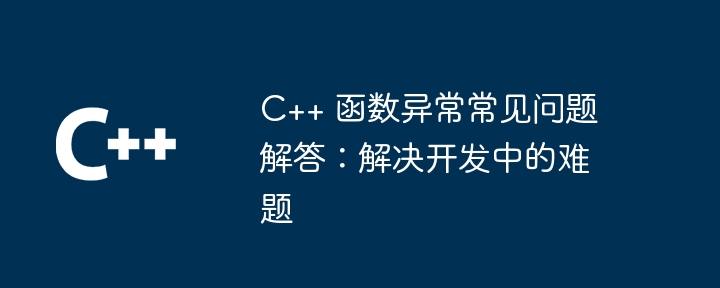
To troubleshoot C function exceptions, follow these steps: Handle exceptions using a try-catch block or the noexcept specifier. Use noexcept when the function truly does not throw any exceptions. Use the throw statement to propagate exceptions to upper-level functions. Use specific exception classes to handle specific exceptions. Use exception handling only when needed, and be careful to use noexcept correctly. Through these steps, you can write more robust, reliable C code.

C function exception FAQ: Solving development problems
When using C functions, function exceptions are the developer's A problem often encountered. This article will discuss common problems with function exceptions and provide detailed code examples to help developers effectively solve development problems.
Problem 1: Not handling exceptions
The most common mistake is not handling exceptions that may be thrown by a function. When functions do not handle exceptions, they terminate the program at runtime.
Solution: Use a try-catch block or the noexcept specifier to handle exceptions.
void function() {
try {
// 可能会引发异常的代码
} catch (std::exception& e) {
// 异常处理代码
}
}Question 2: Not specifying the noexcept
Use the noexcept specifier when the function cannot throw any exceptions Can improve performance. However, noexcept may result in undefined behavior if used incorrectly.
Solution: Use noexcept only if the function really does not throw any exceptions.
int add(int a, int b) noexcept {
return a + b;
}Problem 3: Exceptions not propagated correctly
When calling other functions, it is important that exceptions are propagated correctly. Failure to propagate exceptions results in subsequent functions being unaware of the exception condition.
Solution: Use the throw statement to propagate exceptions to the upper function.
void function() {
try {
// 可能会引发异常的代码
throw std::runtime_error("错误发生"); // 传播异常
} catch (...) {} // 忽略异常
}Issue 4: Handling Irrelevant Exceptions
When using the catch block, it is important to only handle relevant exceptions. Handling irrelevant exceptions reduces program efficiency.
Solution: Use specific exception classes to handle specific exceptions.
void function() {
try {
// 可能会引发异常的代码
} catch (std::runtime_error& e) {
// 处理运行时异常
} catch (std::logic_error& e) {
// 处理逻辑异常
}
}Problem 5: Performance issues
Excessive use of exception handling will affect performance. Unnecessary use of try-catch blocks or inappropriate use of noexcept can slow down your program.
Solution: Use exception handling only when needed, and pay attention to the correct use of noexcept.
By following these FAQs, developers can resolve function exceptions and write more robust, reliable C code.
The above is the detailed content of C++ Function Exceptions FAQ: Solving Development Problems. For more information, please follow other related articles on the PHP Chinese website!
 What are the differences between c++ and c language
What are the differences between c++ and c language
 Recommended learning order for c++ and python
Recommended learning order for c++ and python
 Cost-effectiveness analysis of learning python and c++
Cost-effectiveness analysis of learning python and c++
 Is c language the same as c++?
Is c language the same as c++?
 Which is better to learn first, c language or c++?
Which is better to learn first, c language or c++?
 The difference and connection between c language and c++
The difference and connection between c language and c++
 C++ software Chinese change tutorial
C++ software Chinese change tutorial
 Cost-effectiveness analysis of learning python, java and c++
Cost-effectiveness analysis of learning python, java and c++




